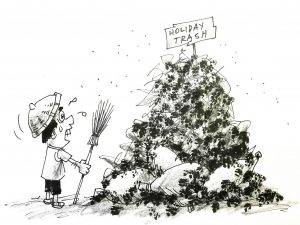The period following Christmas and New Year’s celebrations is marred by excessive waste and debris from holiday festivities, necessitating clean-up drives to address the aftermath of these joyous occasions. By undertaking these initiatives, individuals and communities can collectively minimize the detrimental effects of post-holiday garbage, fostering a cleaner and more sustainable future.
The surge in garbage following Christmas and New Year’s festivities poses a significant threat to the environment. The amplified consumption and disposal of single-use items, packaging materials, and high energy consumption contribute to overflowing landfills and exacerbate greenhouse gas emissions. The excess waste often ends up in our oceans, further contributing to the global issue of plastic pollution. Engaging in post-holiday clean-up drives helps tackle these environmental concerns, as it promotes responsible waste management and encourages recycling and upcycling efforts, thereby reducing ecological footprints.
Beyond its environmental implications, the failure to address post-holiday garbage can have psychological and social repercussions. Prolonged exposure to clutter and filth can induce stress and diminish overall well-being within individuals. Moreover, the sight of overflowing bins and littered streets creates a negative aesthetic impact, damaging the image and appeal of cities and communities. By organizing clean-up drives, communities can actively contribute to fostering a sense of pride, cleanliness, and livability, promoting community cohesion and enhancing overall quality of life.
Clean-up drives present invaluable educational opportunities for communities, with wide-reaching implications beyond the immediate scope of waste management. Introducing and incorporating sustainable practices in households, schools, and workplaces can engender a sense of environmental awareness among individuals. By actively recognizing the repercussions of excess waste and encouraging individuals to take responsibility for their consumption patterns, we can shape future generations to make more sustainable choices. Such initiatives can inspire innovative solutions, research, and policy advocacy to address waste management holistically.
Post-Christmas and New Year’s clean-up drives are therefore essential to minimizing the ecological footprint and ensuring environmental sustainability. By addressing environmental, psychological, and social concerns associated with excessive waste, these initiatives help preserve and enhance our natural surroundings while fostering a sense of ownership and pride within communities.




